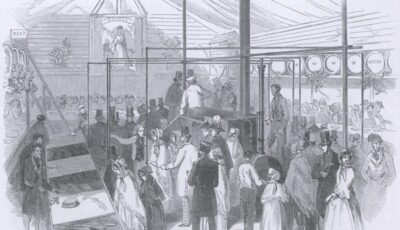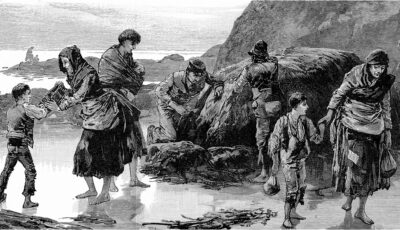The Great Famine of 1845-1848 remains a dark and indelible chapter in Irish history. The destruction of the potato crop by mildew wiped out the main source of food, plunging Ireland into catastrophic famine.
In response, soup kitchens have been set up to alleviate this humanitarian crisis.
However, food aid has proved complex and controversial, notably through the sinister “take the soup” scheme. This expression masked a shocking reality: Irish Catholics forced to renounce their faith in exchange for a meal.
This slogan, engraved in the collective memory, still has a sad resonance in Irish society today.
Irish soup kitchens were established in the early years of the Great Famine in Ireland.
Founded by charities, religious groups and, to some extent, the British government, their mission was to provide food for the most needy.
Based on the principle of voluntary work, these soup kitchens often represented a unique chance of survival for starving populations, and were gratefully received by the Irish…
Unfortunately, the meals were often simple and not very nutritious… but the hungriest were content with that.
These were usually rudimentary soups, made from poor-quality ingredients. The basic ingredients were onions, cabbage, turnips, water and sometimes a little milk.
Bland and of little nutritional interest, these soups were often diluted in liters of water to be able to feed as many people as possible at a time of unprecedented food shortages.
Whenever possible, cornbread (a typical bread of the Americas) was offered as an accompaniment, and made it feel a little more like a full belly.
Meat, on the other hand, was scarce and expensive, and therefore little used in soup kitchens. When it was available, it was used in very small quantities to add flavor.
Be that as it may, these meals were the last line of defence against death for many Irish people. This precious help enabled them to survive and gain a few more days in the face of adversity.
These organizations, drawn from all religious denominations and political parties, were proof of the benevolence and strength of solidarity at the time… until the slogan “Take the Soup” turned ugly as the months went by.

Barrels of soup ready for distribution as part of the “Take the soup” campaign – Public domain
Unfortunately, the initial benevolence of certain organizations eventually gave way to opportunism.
Some soup kitchens of the time were run by the British government and Protestant religious institutions.
As the months went by, the latter saw an opportunity:
why not offer these meals to Irish Catholics on condition that they convert to Protestantism?
The phrase“Take the soup” soon found its way onto posters all over Ireland.
The news circulated in the Irish countryside, where the Famine was hitting the population hardest… particularly in Dingle and on Achill Island.
But the slogan quickly caused a scandal and provoked indignation: how could the British ask the Irish to abandon their faith for the sake of survival? How could they ask them to choose between hell (as a consequence of their change of religious denomination) or survival (thanks to the meals distributed by the soup kitchens?)?
Why such acts in a time of such dramatic misery?

A Dublin Soup Kitchen – Public domain
In truth, behind this slogan lay a particularly dark English strategy: to extend their power over Irish society a little further… by taking advantage of the vulnerability and misery around them.
At that time, Ireland was predominantly Catholic… while England, which had ruled the island since the 16th century, was Protestant and tried to impose its faith, laws and politics on an often-challenged Emerald Isle.
At the time, the British government (led by Lord John Russell) even saw Irish Catholicism as a potential threat to the stability and unity of the empire.
Also, the conversion of the Irish to Protestantism was seen by some as a means of strengthening religious and political unity, while accelerating the assimilation of the Irish into the British Empire.
That’s why soup kitchens were the obvious solution: the English hoped to convert more Irish people to the Protestant faith… and look like saviors at the same time.
However, it would be a caricature to reduce this conversion work to one of colonial interests alone.
Among Protestant evangelicals, many acted without political calculation, with the sole aim of helping and rescuing.
For them, converting Catholics was seen as an act of spiritual benevolence. They sincerely believed that Protestantism was the true path to salvation, and that converting Catholics was a means of “saving” them.
In this light, providing food in exchange for conversion was not seen as coercion, but rather as an incentive to embrace what they considered the true faith.
What’s more, some Protestant preachers saw their faith as morally and socially superior. They believed that Protestantism promoted values such as hard work, order and discipline, and that converting Catholics would help improve their social and economic situation.
In those days, evangelism was common practice among the various branches of Christianity. Protestant missionary groups, in particular, were often motivated by a desire to spread their faith. The famine in Ireland was seen as an opportunity for these missionaries to extend their religious influence.
Such was the case of Reverend Edward Nangle, an Irishman from County Meath, who led an 18-year evangelistic mission on Achill Island. This would have created a veritable Protestant colony.

A scene from the Great Irish Famine – Public domain
There are no precise figures or official statistics on the exact number of Irish who converted to Protestantism in exchange for food during the Great Famine.
Nevertheless, it is estimated that several thousand Irish Catholics renounced their faith in exchange for this soup.
Known as “soupers ” or ” jumpers “, these converts then lived in a climate of popular opprobrium, and were both pitied and despised by the Irish Catholics who stood firm.
However, it is thought that some Irish people may have converted to Protestantism just to have access to soup… without, however, renouncing their Catholic faith. A veritable sham, some individuals converted temporarily, only to return to their Catholic faith once the famine was over. A ploy criticized by some… and described as ingenious by others.
As for the Irish who categorically refused these meals but remained in survival mode, there were few options left: stealing food, forced labor in exchange for meager pittance in workhouses, or emigration to countries like America, England or Australia.
It is estimated that several hundred thousand left Ireland to try their luck in more clement climes.
The phrase “take the soup” has remained in Irish collective memory as a symbol of British Protestant oppression and manipulation during the Great Famine.
The Irish are so attached to their duty of remembrance that they grimace at the mere mention of the slogan. For them, it evokes a terrifying period that affected their families generations ago.
It is a powerful reminder of the abuses committed by the British at the time, who were prepared to do the unthinkable to extend their control over Ireland.
It also illustrates the extreme desperation people faced, and the painful choices imposed by circumstances beyond their control.